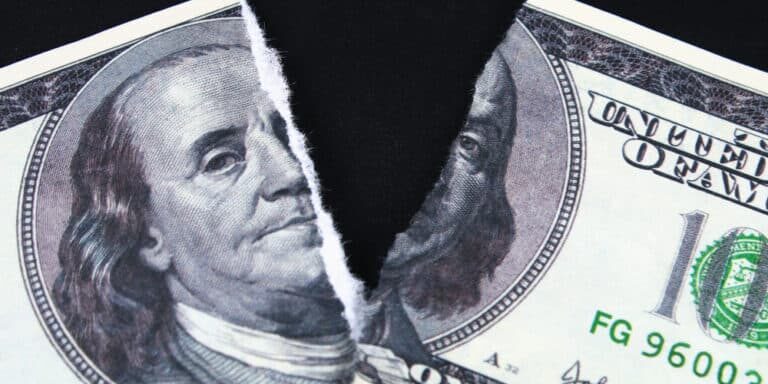
The Dollar’s Catastrophic Decline Underscores Gold's Indispensable Value
EDITOR'S NOTE: The once-almighty US dollar is now spiraling into a stunning collapse as the world's reserve currency, sending ripples through global markets. Amidst this financial chaos, the spotlight shifts to the unwavering importance of gold as a safe haven asset. This analysis will delve into the factors driving the dollar's demise, exploring how gold's time-tested resilience and stability emerge as the ultimate bastion of financial security in an increasingly volatile and uncertain economic landscape.
(Kitco News) Markets need to pay closer attention to the de-dollarization trend since the greenback is losing its power as a reserve currency faster than many analysts are noticing, according to Stephen Jen, CEO and co-CIO of Eurizon SLJ Capital.
The dollar's loss of its reserve currency status accelerated last year when the greenback was used against Moscow as part of the sanction package after Russia invaded Ukraine. In 2022, the USD's share as a global reserve currency fell at ten times the average pace of the past 20 years, Jen said in a report.
"The dollar suffered a stunning collapse in 2022 in its market share as a reserve currency, presumably due to its muscular use of sanctions," Jen wrote. "Exceptional actions taken by the U.S. and its allies against Russia have startled large reserve-holding countries, most of which are from the Global South."
According to Jen's calculations, the greenback's share of official global reserve currencies dropped from 73% in 2001 to about 55% in 2021. And in 2022, it tumbled to 47% of total global reserves.
Coordinated sanctions against Russia alerted many countries, pushing them to seek currency alternatives — for trade settlements and reserve build-up.
"It seems reasonable to speculate that the main driver of the collapse in USD's reserve status in 2022 may have reflected a panicked reaction to property rights being jeopardised. What we witnessed in 2022 was sort of a 'defund-the-global-police' moment, whereby many reserve managers in the world disagreed with the conduct of both Russia and the U.S.," the note said.
The note added that analysts are failing to notice these changes because the nominal value of the world's central banks' dollar holdings is usually used in calculations and changes in the price of the dollar go unaccounted for.
"Adjusting for these price changes, the dollar, we calculate, has lost some 11 percent of its market share since 2016 and double that amount since 2008," Jen wrote.
Jen is a well-known analyst who coined the "dollar smile" theory while at Morgan Stanley. The theory's premise is that the USD does well when the U.S. economic growth runs at full speed.
King dollar's position as the world's reserve currency hangs on how quickly and successfully other financial markets develop.
"If the financial markets outside the U.S. could thrive (growing in size and becoming ever more energetic, without being unstable), and if the opposite happens in the U.S., the dollar could very well meet its demise. This is, however, not an imminent risk, in our opinion, though the trends are heading in that direction," Jen described.
Analysts who continue to ignore the de-dollarization trend are being too complacent. "If the U.S. makes more policy errors and abandons the culture of self-examination, there will likely come a time when much of the rest of the world will actively avoid using the dollar," Jen wrote. "While the Global South is unable to totally avoid using the dollar, much of it has already become unwilling to do so."
More and more countries, led by China and Russia, are making bilateral trade agreements that exclude the U.S. dollar. The yuan is already the most traded currency in Russia, according to data compiled by Bloomberg. This happened only in February after the yuan surpassed the dollar in monthly trading volume for the first time.
China recently completed the first yuan-settled LNG trade. China also struck a deal with Brazil to trade in their own country's currencies.
At the same time, China and Malaysia are discussing the creation of an Asian Monetary Fund to reduce reliance on the U.S. dollar, while India and Malaysia announced that they abandoned trading in U.S. dollars and can now settle in Indian Rupees.
Also, central banks have been flocking to gold as a preferred reserve asset, buying record amounts in 2022.
Former Goldman Sachs chief economist Jim O'Neill recently called on the BRICS bloc — made up of Brazil, Russia, India, China, and South Africa — to expand and challenge the dominance of the U.S. dollar.
And U.S. Treasury Secretary Janet Yellen admitted this week that using sanctions could threaten the dollar's dominance.
Originally published by: Anna Golubova on Kitco News











